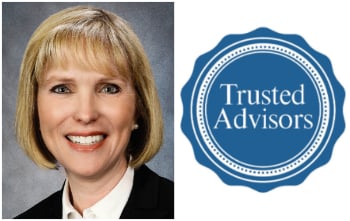
Often, the term “trusted advisor” is used in the business world. In fact, it’s so widely used that many may not truly understand what it means.
Trust is defined as “assured reliance on the character, ability, strength, or truth of someone.” As a trusted advisor, Karen Brown, First Bank Commercial Loan Officer, has found there are key principles that define a trusted advisor, including integrity, knowledge, expertise, and responsiveness. Also important are long-term relationships with clients; finding the best solutions; creative problem solving; and having trust in all parties involved. Another key attribute is having a solid reputation within one’s own organization.
“Having the ability to draw trust internally often grants you a stronger ear that otherwise might be ignored,” said Brown. “This applies when a client needs a special condition in their loan that needs conveyed to the bank’s senior management in order to obtain support for the request.”
In being the best trusted advisor possible, dealing with all stages of business in a professional, proactive manner is critical. Clients in the middle market world come with a level of sophistication, requiring the highest level of banking management. Meaning, that no matter what the goal is, all parties will work together to get the best possible results. As a business owner, it starts by working with a trusted advisor. It then requires your advisor to have a cache of knowledge to reach the best possible solution, even when this involves the added expertise of a third-party.
Brown recalled an existing manufacturing client was experiencing financial stresses in its business from competitive market pressures, gross margin compression, and increasing labor costs. “In discussing with the owner his action plan for moving the business through the current cycle, the owner acknowledged he felt his knowledge base just wasn’t broad enough to work through current issues,” she said. “The owner thought it was time to wind the business down; however, he was concerned about his employees’ futures, many of which were long-term employees.”
The owner admittedly needed direction from industry specialists to help guide him through the next steps. “He knew I had years of experience in financing businesses through many operating cycles,” said Brown, “and that I also maintained a broad base of contacts.” Brown happily referred consultants she knew specializing in business turnarounds and business sales. Through those introductions, the consultants reviewed their business operations, determining it was fundamentally a sound company, required some internal restructuring, and needed stronger financial backing to carry the business to the next level. The consultant recommended a possible merger as an alternative to downsizing or selling.
That conversation led to bringing the owner and a strategic partner together. The buyer, a larger corporation, had been seeking a strategic business purchase to expand its product base and footprint. “I’m happy to say, that business is now thriving, with its regional market share growing for the purchase partner,” said Brown. “The owner admits that asking for advice from a trusted advisor, trusting the referrals to be the right ones, and taking the leap to use that advice was the best thing he ever did.”
A business/trusted advisor relationship often develops over time, after nurturing a long term relationship with their business banker partner, or trusted advisor. Sometimes, it comes spontaneously when the banker and business owner is discussing an item that brings about a series of discussions, resulting in an entirely different need than originally thought. It can develop with further diligence, getting all parties involved on both sides, and discussing issues in an open, communicative manner.
“I see this occurring when a large loan request is being considered, and the structuring of that credit facility requires input from the company’s CPA, attorney, and consultant,” said Brown. “Occasionally, it requires letting your banking partner work through their internal organization, discussing the request with his or her senior management to achieve ‘buy in’ before moving forward on a request.”
Brown said becoming a trusted advisor comes with knowing and anticipating any hurdles, having a sense of urgency, and understanding your clients. It comes with respect and dignity between all parties. It comes with knowing your business banker is—and should be—your trusted advisor.
Possessing over 30 years of experience, Karen Brown, Commercial Team Leader, is responsible for overseeing a team of relationship managers, while servicing her individual client portfolio and developing new business.
KAREN BROWN
SENIOR VICE PRESIDENT
COMMERCIAL TEAM LEADER
(818) 226-3233
[email protected]
FIRSTBANKS.COM
